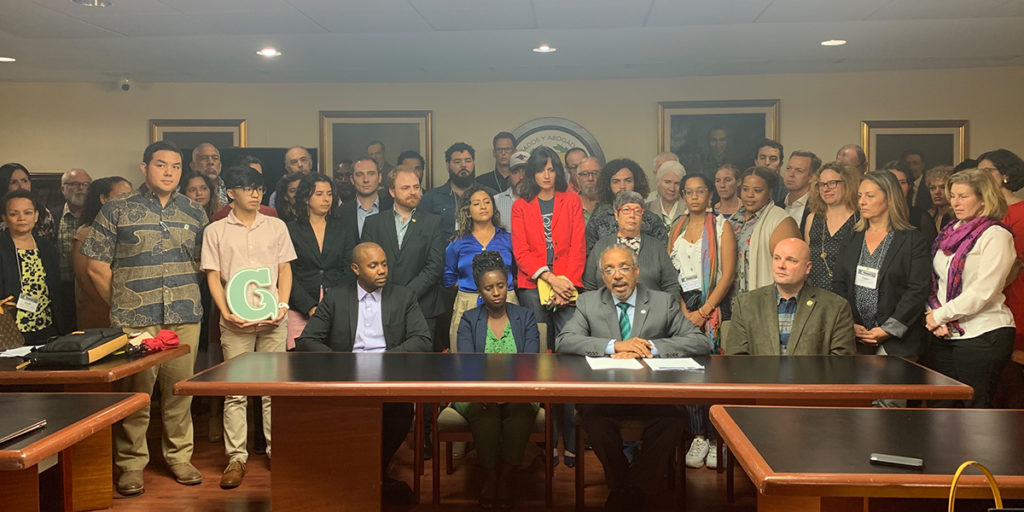“Under the weight of climate change impacts—biodiversity loss, debilitating storms, and
swallowing seas—islands are not sinking. Strong and resilient, islands are rising.”In solidarity, islands are uniting in common purpose….islands are distant, but they are not alone.
Together, Islands Are Rising.”DR. AUSTIN J. SHELTON
Director of the University of Guam Center for Island Sustainability and Sea Grant
and Co-Chair of the Climate Strong Islands Network Steering Committee
These excerpts from Dr. Austin Shelton, director of the University of Guam Center for Island Sustainability and Sea Grant, in his March 2021 testimony to Congress help get to the heart of why the Island Institute is helping to launch a new, national network focused on increasing the climate resilience of islands across the U.S. The Climate Strong Islands Network is building momentum for local and federal action on climate for islands that are U.S. territories, states, and parts of states, and Shelton serves as a co-chair. As we help to prepare for the network’s September 23rd virtual fall gathering, I want to share why the Island Institute is leaning into this important work.
Throughout our nearly 40-year history, the Island Institute has often played a role to help connect Maine’s island communities to other, similarly situated communities in the U.S. and beyond. By participating in networks, learning exchanges, and even research publications, we’ve seen the value in helping Mainers expand their networks and even build their confidence as leaders by providing an avenue for them to share the stories of their hard work. Over the past five years, this approach has become an intentional part of our program design: creating opportunities that make it easier for local leaders to access what has worked in other places and partnering beyond Maine to create opportunity for our coast and others.
Just before the pandemic started, our 2020 Waypoints Forum, which focused on “Courageous Leadership in Disruptive Times,” gave us the opportunity to better understand the impact of natural disasters on island communities. We were deeply moved by the stories of how Christine Nieves of Puerto Rico and Miles Stair of St. John responded to hurricanes in the Caribbean. We found that not only could Maine communities learn from their community-centered approaches to navigating disruption, but it also forced us to confront how policy-related failures and systemic injustices make it harder for many island communities to respond. Island communities are on the frontlines of the climate crisis and their unique geography means they regularly see greater impacts from climate change but benefit less from government programs and policies which are not designed with islands in mind.
Just a few weeks later, I traveled with former Institute President Rob Snyder and three community leaders from Maine islands to join the signing of the Climate Strong Islands Declaration in San Juan, Puerto Rico. After connecting with many U.S. island leaders on the potential for collective action in 2019, the Island Institute participated in a collaborative process to co-author the declaration with representatives from across the country and committed to help launch a network that could find concrete ways to further its goals.
By the end of 2020, the Climate Strong Islands Network had formed an independent steering committee, and the network was ready to go from a concept to a staffed initiative thanks to the generous support of the New York Community Trust and the leadership of the Global Island Partnership and the Ocean Foundation. In 2021, we brought on a skilled network facilitator and an experienced lobbyist team, so that we could more quickly exchange information between island regions in the U.S. on how they are responding to climate change and create a first-ever federal policy platform for islands from which the network can advocate for more island-relevant climate policy and programs.
On September 23rd, we’ll meet again for the network’s fall convening, held in conjunction with Climate Week NYC and the United Nations General Assembly. We’re excited to present our national policy framework for feedback and share stories of the progress that U.S. islands are making to become more climate resilient. We are looking forward to welcoming returning and new participants to the network. If you’re working on climate-related issues on a U.S.-based island, we encourage you to tune into the event and consider signing the declaration.
The policy framework will help bring attention to the unique needs of island communities—both in those places where well intended policies don’t quite fit or work and also those places where islands communities are well suited to lead the nation on building community resilience. This framework will help contextualize concerns and issues arising from Maine islands as nationally relevant policy issues instead of one-off, community specific concerns. By strengthening the connections between island communities around the country, we believe that Maine islands will benefit from the learnings of island community leaders elsewhere, and Maine community leaders will be able to share their innovative work. By working together, as our colleague in Guam suggested, we believe there is a strong opportunity to help island voices rise and be at the forefront of national community resilience conversations.
To learn more about the Climate Strong Islands Network, visit its website. To register for the September 23rd virtual gathering, click here.
Suzanne MacDonald is the Chief Community Development Officer at the Island Institute.


